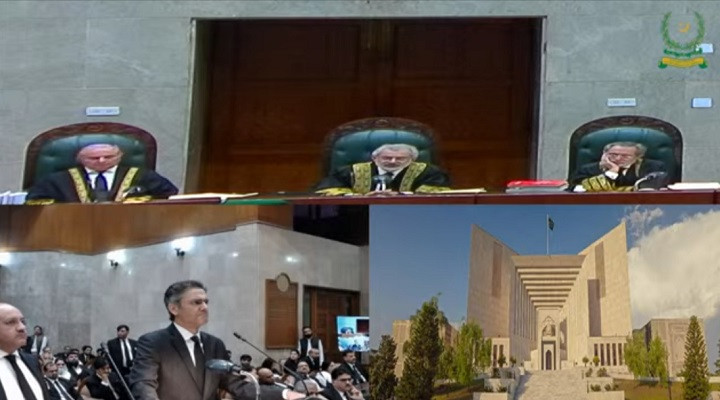
A Supreme Court hearing on Tuesday in the suo motu case prompted by a letter of six Islamabad High Court (IHC) judges about meddling in judicial affairs, focused on the integrity of the judiciary and its independence with one judge saying that decades of deception had tarnished the judiciary’s reputation.
A six-member bench, led by Chief Justice Qazi Faez Isa, and comprising Justice Mansoor Ali Shah, Justice Jamal Khan Mandokhel, Justice Athar Minallah, Justice Mussarat Hilali, and Justice Naeem Akhtar Afghan, heard the case.
As arguments unfurled, the discussion turned to past events like the 2007 judicial crisis, the members of the bench highlighting the importance of truth, strengthening the system to empower judges to defy any sort of pressure and deliver justice.
“There is no pill in the market that could make a judge stronger,” remarked Justice Shah. “The judges are strengthened by the system. We have to devise a system so that when a judge stands up, the whole judiciary stands behind him,” he said, adding if a judge was complicit, he could be removed.
As arguments unfurled, Justice Minallah acknowledged that decades of deception had tarnished the judiciary’s reputation. “We lied for 76 years and hid the truth,” he lamented. He also posed a question about accountability: “To whom do we answer? Are we answerable to the people?”
In March, six IHC judges wrote a letter to the Supreme Judicial Council (SJC), saying that agencies were meddling in judicial matters. On that the chief justice, who is also the head of the SJC, summoned a full court meeting of the Supreme Court judges and also held a meeting Prime Minister Shehbaz Sharif.
Later, the apex court took suo motu notice of the matter. Initially, Justice Yahya Afridi was part of the seven-member bench for the hearing of the suo motu case, but later he recused himself. The case also clubbed together more than 10 petitions filed by various bars associations on the issue.
On Tuesday, Supreme Court Bar Association (SCBA) President Shehzad Shaukat began his arguments. He told the bench that when it was stated that the Supreme Court was complicit or the higher judiciary was compromised, “we are not sending a good message”.
On this, Justice Minallah asked Shaukat as to whom the judges were answerable, adding that were they answerable to the people. Shaukat replied that “We are answerable to Allah.” The judge said that for 76 years lies were told and the truth was hidden that damaged the reputation of the judiciary.
Chief Justice Isa observed that if anyone was a complicit, then he should not sit in the court. Justice Shah remarked that the apex court judges would have to devise a system so that “when a judge stands up, the whole judiciary stands behind him” and if a judge was complicit, he could be removed immediately.
Justice Mandokhel remarked that all the political parties wanted that the judiciary was used for them. Justice Minallah said that in the 2018 general elections, one political party was the beneficiary, and now in the 2024, another party was beneficiary.
The chief justice remarked that the noblest of all principles in the world was to speak the truth, stressing that truth made everything right. He emphasised that judges should not come under pressure, saying that whoever could not sustain pressure, should go home.
To a point, Justice Minallah said that when the Supreme Court could not have the courage to use its power, how it could be expected from a judge of the lower judiciary to exercise the power of contempt of court.
Chief Justice Isa said that in every institution, including the judges and the lawyers, there were good people as well as bad people. He rejected the notion that the judges were weak, saying that no one could remove even a civil judge, as there was a forum for complaints against judges.
At the outset of the hearing, the attorney general for Pakistan (AGP) requested a day’s time for filing the government’s response on the matter. He said that the written order of the previous hearing had been received on Tuesday, which had to be shown to the prime minister for preparing the reply.
The chief justice told the AGP that there was a separate note of Justice Minallah. The note stated that the federal government controlled the agencies and that the federal government should respond to the allegations in the judges letter and ensure that there was no meddling in the judicial matters.
The chief justice then instructed that the court would first hear the bar representatives and then the individual lawyers. The chief justice expressed his surprise at the submission of separate replies by lawyers and bars, asking why everyone was not on the same page on the independence of judiciary.
Starting his arguments, Pakistan Bar Council (PCB) Vice Chairman Riazat Ali Sahar stated that kidnapping the judge’s brother-in-law, throwing crackers in the session judge’s house, and installing surveillance cameras in a judge’s bedroom were serious allegations.
He recommended a judicial inquiry into the matter, suggesting that a judicial commission, consisting of one or more serving judges of the Supreme Court, should be formed to determine and punish those responsible.
Advocate Ahmed Hasan Shah appeared on behalf of the Islamabad High Court Bar Association (IHCBA). Shah argued that internal and external interference in the judiciary should be examined. The chief justice said that “we cannot change what happened in the last 50 years, we can only sympathise.”
Justice Mandokhel said that a judge should strengthen himself that no one could dare put him under pressure. The chief justice said that a judge has constitutional protection. Justice Shah said there was no pill in the market that could make a judge stronger, rather he would be empowered by the system.
The chief justice said that a judge reduced his authority, when, instead of taking action, he complained about interference in the judicial affairs. Justice Minallah said that if they were accepting interference in the judiciary, it meant that the country was not being run according to the Constitution.
Later, the bench, adjourned the hearing of the suo motu notice case for an indefinite period. The court said that the next hearing would be held upon availability of the judges.



















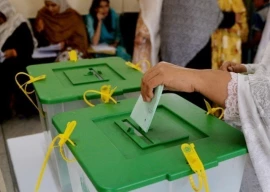

1716056648-0/IMG-20240512-WA0013-(1)1716056648-0-270x192.webp)
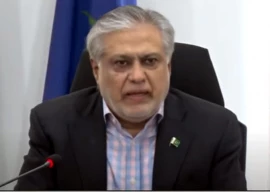
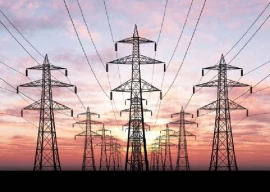
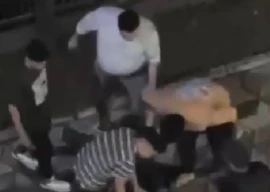
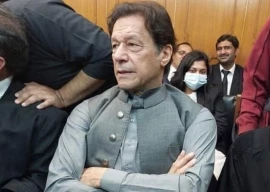
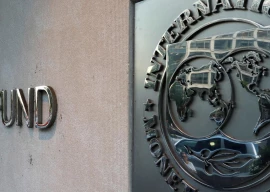






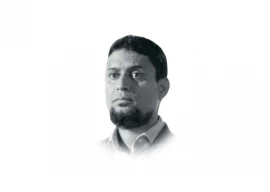

COMMENTS
Comments are moderated and generally will be posted if they are on-topic and not abusive.
For more information, please see our Comments FAQ